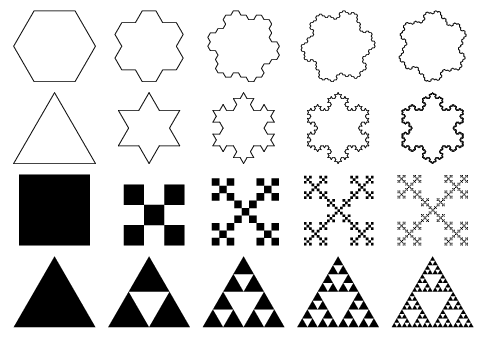
Fractals is the best invention of nature. There are fractals all around us.
A Fractal is a simple pattern which when repeatedly applied takes a complex structure that in turn handles many complexities. The good news is that learning simple pattern usually takes less than 1 hour. For Example if you see the above patterns a simple shape like Triangle or square when repeatedly applied creates intricate patterns. Watch the 2 videos below to understand more about fractals.
In HiPoHa inspired by this concept from nature we have created fractals which can help us become high performers.
The list of fractals are listed below.
Glossary Of Fractals
| Fractal | Description |
|---|---|
| CQA – Curiosity Question Asked | Helps detect unknown signals, which in turn lead to “Bottom Of Iceberg” opportunities. To discover bottom of the iceberg needs of the customers we need to be able to pick up important signals. But these signals will only be generated by asking questions in a particular manner. This method addresses that need. |
| TG – Tiny Grit | Helps build consistency |
| TT – Tiny Trust | Help increase influence |
| UPSA – Unusual Problem Solution Achievement | A simple storytelling technique which helps us influence to make change management easier. A sure-fire method to pitch an idea or a possibility or a solution, which |
| XFD – Transformative(XF) Delegation | Using delegation as a method to transform teams. A method of delegation which not just reduces the workload of the person delegating the work but enhances the output produced leveraging the individual’s creativity and ownership |
| V&V –Views & Viewpoints | Helps generate multiple perspectives to any given scenario and situation, which in turn leads to better and multiple possibilities for solutions. Shifts attention and focus from being stuck to either one scenario or solution to a world of possibilities. |
| XFC – Transformative Collaboration | Transports awareness to a Transformative experience to ALL the players in a collaborative environment, from a state of of merely getting the work done, for the sake of it. Has a wide range applicability in any form of collaboration, be it inter or intra teams with peers, senior stakeholders, intra or inter other departmental and /or with customers. |
| PUX Performance Undersupply | A unique way of unravelling customer delight, as opposed to merely providing customer satisfaction, be it in services or products. A methodology which helps discover opportunities that are either unstated nor visible, and are aplenty. They are usually the hidden gems which leads to Customer delight. |
| DDS Digital Dipstick Solution | Is a Digital Transformation tool, deployed to identify the best digital dot [options] that could be deployed for any given scenario, within the limited constraints of time and resources. |
| Tiny Grit ® Building consistency | Many of us do good things but doing it consistently is always a challenge. And to do something consistently we need to be persistent. Any transformation requires persistent effort to make the shift. There is a method to build the persistence muscle in our brains. Tiny Grit helps one reach there |
| PLS Plussing | While working in a collaborative environment, providing feedback is a given. Plussing, always focusses on improving the ‘what is. Conventional feedback methods merely reflect what works and what doesn’t. Plussing, on the contrary, drives the mind to give feedback on how to make it better. ‘Is there a better way?’ Is always the plussing approach. |
| MVP Loop Minimum Viable Product Loop | MVP loop is all about giving life to an idea. Emphasizes is always on getting results and not to merely keep ideating. Makes things happen in quick and short cycles, is the philosophy of the MVP approach. Guiding the limited resources available into actions, so that results happen within 3 weeks. Given that there is always a constraint of resources, |
| TLM Traffic Light Model. | As the name suggests, this has application wherever categorization is required. Interestingly this can have a wide application be it in decision making, optimization of resources, levels of complexity, classifying degrees of importance etc. Decisions can be made quickly once categorization based on Traffic Lights is done. |